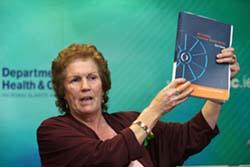Travellers' lives as short as some in developing countries

On 2 September, Minister Mary Harney launched the first ever All Ireland Traveller Health Study. The minister herself acknowledged that there was 'no good news' in terms of Travellers' life expectancy.By Sara Burke.
Some of the key findings in the report are:
Traveller men die younger from all the diseases that the rest of us do. There are very few Travellers over 60 years old, especially men. We know the things that affect our health are income, education, job opportunities, housing and accommodation and Travellers experience poorer standards of these than the general population.
While many Traveller women have become involved in community employment schemes and health work in the past twenty years, the reverse has happened for Traveller men; most are unemployed, the jobs/roles they used to do no longer exist – the lack of a role and a job is very corrosive and impacts negatively on their physical and mental health.
Also, the research shows the men are exposed to hazardous and dangerous conditions in the work they do and huge hostility and discrimination towards Traveller men is present.
So what could have been done to improve Travellers health, especially men's health? Speaking at the launch, Minister Harney said the responses were a 'no brainer' from the evidence produced in the report.
When asked to identify the top three things government could do to improve Travellers' health Mary Harney said 1: Education 2: Housing and 3: Access to health services.
It is interesting that this work shows it is not the type of accommodation you are in that is the most important to your health if you are a Traveller, it is your access to amenities.
So if you live in a house or a caravan with no access to water, on badly lit roads, beside a dump (and many sites are beside dumps) then your health is going to be poorer than if you have good quality surroundings and facilities. And local authorities are responsible for those facilities.
In the qualitative research Travellers identified education as the most important factor in improving their health. Travellers' participation in school and training has improved, in particular in primary school but participation gets less as they get older.
More Traveller children are in school but there is a need to look at the quality of their education. For example, children aged 6/7 reported not wanting to admit they are Travellers in school; 'knacker' is one of the most common forms of abuse on the school yard; children report getting off the bus two to three stops early so other kids won't know they are Travellers.
Prof Cecily Kelleher and her team of colleagues in UCD who led this research were keen to emphasise the central role that 400 Travellers who were trained to carry out much of the research played in it.
The research found that Travellers have pretty good access to health care – nearly twice as many traveller women had had breast screening and smear tests than the general population and this is directly attributable to the work of the Travellers Primary Healthcare (PHC) projects, which were set up by Pavee Point in the 1990s.
These are Travellers health projects led and run by Traveller women, many coming out of community development projects. It also found that 4/5 of Travellers got their health information from these PHC projects.
Missie Collins (pictured) one of the leading Traveller women in primary healthcare spoke at the launch and highlighted the need to invest in, not cut, the PHC projects but also the fact that the Travellers infrastructure that carried out this research is being cut through job losses, fewer scheme places and also the changing roles of the community development projects.
She pointed out that Travellers can't do the work on fresh air and that €3 out of the €12 million allocated to Travellers' health was missing.
The research also found much higher levels of social capital, of family and community support, a very strong sense of community, high levels of trust within the community, and the importance of their identity and culture and the real benefit of the empowerment of women.
